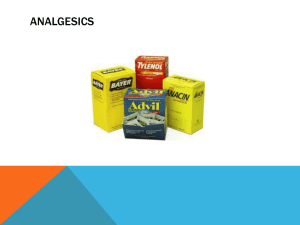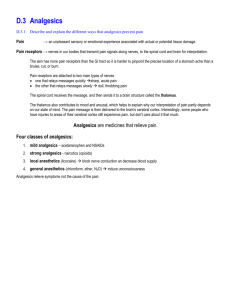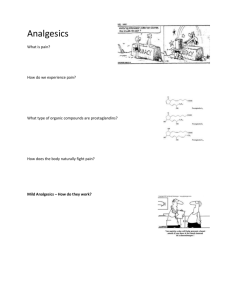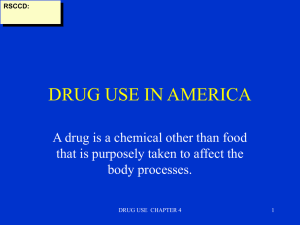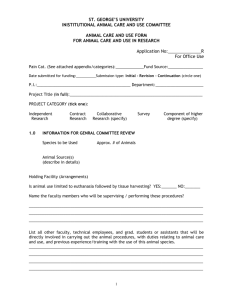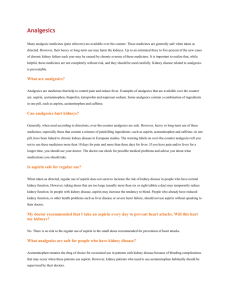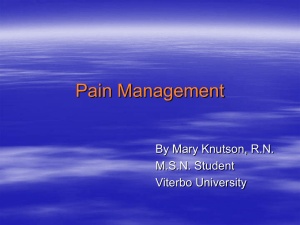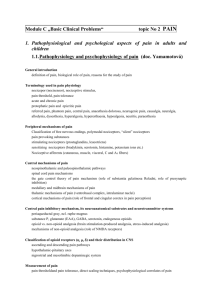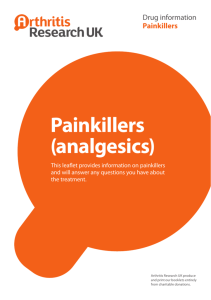Analgesic Fact Sheet - The Salvation Army Southern Territory
advertisement
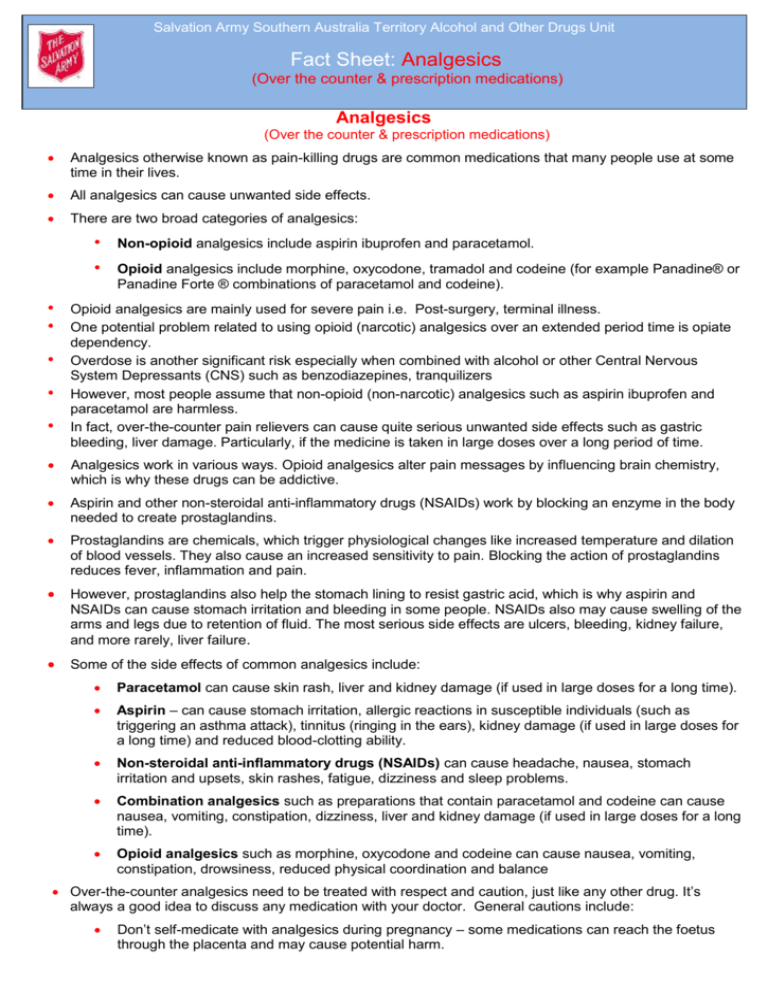
Salvation Army Southern Australia Territory Alcohol and Other Drugs Unit Fact Sheet: Analgesics (Over the counter & prescription medications) Analgesics (Over the counter & prescription medications) Analgesics otherwise known as pain-killing drugs are common medications that many people use at some time in their lives. All analgesics can cause unwanted side effects. There are two broad categories of analgesics: • • • • • • Non-opioid analgesics include aspirin ibuprofen and paracetamol. • Opioid analgesics include morphine, oxycodone, tramadol and codeine (for example Panadine® or Panadine Forte ® combinations of paracetamol and codeine). Opioid analgesics are mainly used for severe pain i.e. Post-surgery, terminal illness. One potential problem related to using opioid (narcotic) analgesics over an extended period time is opiate dependency. Overdose is another significant risk especially when combined with alcohol or other Central Nervous System Depressants (CNS) such as benzodiazepines, tranquilizers However, most people assume that non-opioid (non-narcotic) analgesics such as aspirin ibuprofen and paracetamol are harmless. In fact, over-the-counter pain relievers can cause quite serious unwanted side effects such as gastric bleeding, liver damage. Particularly, if the medicine is taken in large doses over a long period of time. Analgesics work in various ways. Opioid analgesics alter pain messages by influencing brain chemistry, which is why these drugs can be addictive. Aspirin and other non-steroidal anti-inflammatory drugs (NSAIDs) work by blocking an enzyme in the body needed to create prostaglandins. Prostaglandins are chemicals, which trigger physiological changes like increased temperature and dilation of blood vessels. They also cause an increased sensitivity to pain. Blocking the action of prostaglandins reduces fever, inflammation and pain. However, prostaglandins also help the stomach lining to resist gastric acid, which is why aspirin and NSAIDs can cause stomach irritation and bleeding in some people. NSAIDs also may cause swelling of the arms and legs due to retention of fluid. The most serious side effects are ulcers, bleeding, kidney failure, and more rarely, liver failure. Some of the side effects of common analgesics include: Paracetamol can cause skin rash, liver and kidney damage (if used in large doses for a long time). Aspirin – can cause stomach irritation, allergic reactions in susceptible individuals (such as triggering an asthma attack), tinnitus (ringing in the ears), kidney damage (if used in large doses for a long time) and reduced blood-clotting ability. Non-steroidal anti-inflammatory drugs (NSAIDs) can cause headache, nausea, stomach irritation and upsets, skin rashes, fatigue, dizziness and sleep problems. Combination analgesics such as preparations that contain paracetamol and codeine can cause nausea, vomiting, constipation, dizziness, liver and kidney damage (if used in large doses for a long time). Opioid analgesics such as morphine, oxycodone and codeine can cause nausea, vomiting, constipation, drowsiness, reduced physical coordination and balance Over-the-counter analgesics need to be treated with respect and caution, just like any other drug. It’s always a good idea to discuss any medication with your doctor. General cautions include: Don’t self-medicate with analgesics during pregnancy – some medications can reach the foetus through the placenta and may cause potential harm. Don’t give children adult medicines or over-the-counter analgesics unless you have been advised to do so by your doctor or pharmacist. Keep all medicines out of reach of children. Take care if you are elderly or caring for an older person. Older people have an increased risk of unwanted side effects. For example, taking aspirin regularly for chronic pain (such as arthritis) can cause a dangerous bleeding stomach ulcer. Always tell your pharmacist about any prescription medicines you are taking so they can help you choose a safe analgesic. Over-the-counter medicines can interact with other medicines, possibly to stop them working correctly and sometimes dangerously. Don’t take more than one over-the-counter medicine at a time, or you may unintentionally take an overdose. For example, many ‘cold and flu’ tablets already contain paracetamol, so it is important not to take any other paracetamol-containing medicine to avoid an overdose. See your doctor or health care professional for proper treatment for sport injuries; don’t use pain reliever medicines to ‘tough it out’. Consult your doctor or pharmacist before using any over-the-counter medicine if you have a chronic physical condition, such as heart disease or diabetes. Combining opioid analgesics with alcohol can lead to overdose and/or death Further information can be obtained from: Your doctor Pharmacist National Prescribing Service, Australian Drug Foundation Tel. 1300 85 85 84 (for information); 1800 888 236 (for counselling and referral) References http://www.rxlist.com/script/main/art.asp?articlekey=94691&page=2 http://www.druginfo.adf.org.au/drug-facts/analgesics-painkillers http://www.betterhealth.vic.gov.au/bhcv2/bhcarticles.nsf/pages/Medications_non-steroidal_antiinflammatory_drugs http://www.webmd.com/pain-management/narcotic-painkillers
